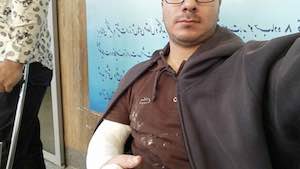By Matthew Vadum ——Bio and Archives--November 26, 2015
Canadian News, Politics | CFP Comments | Reader Friendly | Subscribe | Email Us
 A young Iranian filmmaker named Emadeddin (Emad) Tayefeh was forced to flee his homeland earlier this year after its totalitarian regime grew suspicious of his latest documentary project that focuses on political repression in that country.
In early August, Tayefeh hopped on a bus bound for the Turkish border, following beatings and imprisonment at the hands of the Islamic regime for shooting video footage for his anti-government film, the Guardian (UK) reports.
“My heart was beating so fast,” he said. “I wasn’t allowed to leave the country, and I’d bribed the border police to get an exit permit. I had to cross the border without wasting time.”
A young Iranian filmmaker named Emadeddin (Emad) Tayefeh was forced to flee his homeland earlier this year after its totalitarian regime grew suspicious of his latest documentary project that focuses on political repression in that country.
In early August, Tayefeh hopped on a bus bound for the Turkish border, following beatings and imprisonment at the hands of the Islamic regime for shooting video footage for his anti-government film, the Guardian (UK) reports.
“My heart was beating so fast,” he said. “I wasn’t allowed to leave the country, and I’d bribed the border police to get an exit permit. I had to cross the border without wasting time.”Is it our government? The U.S.? Israel? During the documentary we conclude that we are our own enemy. We, the Iranian people. Our enemy is our indifference, our fear. All these have made us passive. We want to say that we are the problem and if we want to make a change in Iran, we need to start with ourselves.Shooting footage in public or with a film camera was out of the question. Preliminary footage began to be taken in March. The plan called for Nourizad to hold an exhibition in mid-June of his paintings in a closed area in Tehran. In order for the event to be captured as inconspicuously as possible, Tayefeh resolved to record video digitally on a mobile telephone. According to the Guardian,
Tayefeh says he was soon attacked twice. ... “On 1 April they attacked me on the street, splitting my head and breaking my wrist,” he said. “And in early May they arrested me on the street and took me to the Revolutionary Guards’ base in the Shahid Mahallati complex [in north Tehran]. They beat me up again and after three days, set me free with a bruised body and a dislocated shoulder.”Hundreds of pro-reform activists attended the art exhibition that opened on June 11 and lasted nine days. Tayefeh got it all on his phone's camera. Soon after, Tayefeh went into hiding in northern Iran. By August, he was in Turkey, editing the first part of Public Enemies. At time of writing he was still in Turkey. But his American lawyer, New York-based Irina Tsukerman, is working to get Tayefeh stateside. She is astonished that the West has not yet embraced her client's cause.
I thought that the West would fawn over an opportunity to meet someone like Emad, a warm, genuine believer in the inherent worth of every human being, who did not become bitter, deceptive, and cynical as a result of betrayals and horrific experiences.But Tsukerman hasn't given up.
Despite everything he went through, despite a complete lack of support from the West, despite being alone on his journey, he succeeded in something so many have failed at - winning, getting ahead of the regime, never succumbing to the oppression, escaping on his own and alive, smuggling out the film that nearly cost him his life, and resisting all attempts, however well-crafted, to lure him away from his path.Tayefeh was wise to get out of Iran when he did. The Islamic Republic's kangaroo courts have been cracking down on artistic and political expression deemed threatening to the status quo. Over the summer, Mostafa Azizi, a filmmaker, writer, and TV producer, received an eight-year prison term; Atena Farghadani, a painter, 12 years; Atena Daemi, an activist opposed to the death penalty, 14 years. According, again, to the Guardian:
All three have been found guilty of insulting Iran’s supreme leader, Ayatollah Ali Khamenei, through their activities on social networking sites such as Facebook. They have also been convicted of other vague charges, which are often used against activists held on political grounds, including “spreading propaganda against the ruling establishment.”After completing a six-year prison term, reform leader and journalist Ahmad Zeidabadi was banished to Gonabad, 600 miles from Tehran. Nourali Tabandeh, a dervish (kind of like a mendicant monk), is forbidden from residing in Gonabad, his home town. So far Tayefeh has avoided the fate of his countrymen. Tsukerman wants her client to move to America so he can tell his story about the horrors of the Iranian regime. She said:
He consistently acted in a principled way of someone who has something very important to share - the values and belief and dedication to those very Western values we claim we want to see flourish in the Middle East and around the world. I call on our country, our government, and the American nation to put our beliefs where our mouth is - and embrace Emad, bring him here, give him access to the resources he can use to fulfill his potential, allow him the opportunity he has well earned by showing that not only is he our friend and ally, but actually, he is one of us.
View Comments
Matthew Vadum, matthewvadum.blogspot.com, is an investigative reporter.
His new book Subversion Inc. can be bought at Amazon.com (US), Amazon.ca (Canada)
Visit the Subversion Inc. Facebook page. Follow me on Twitter.